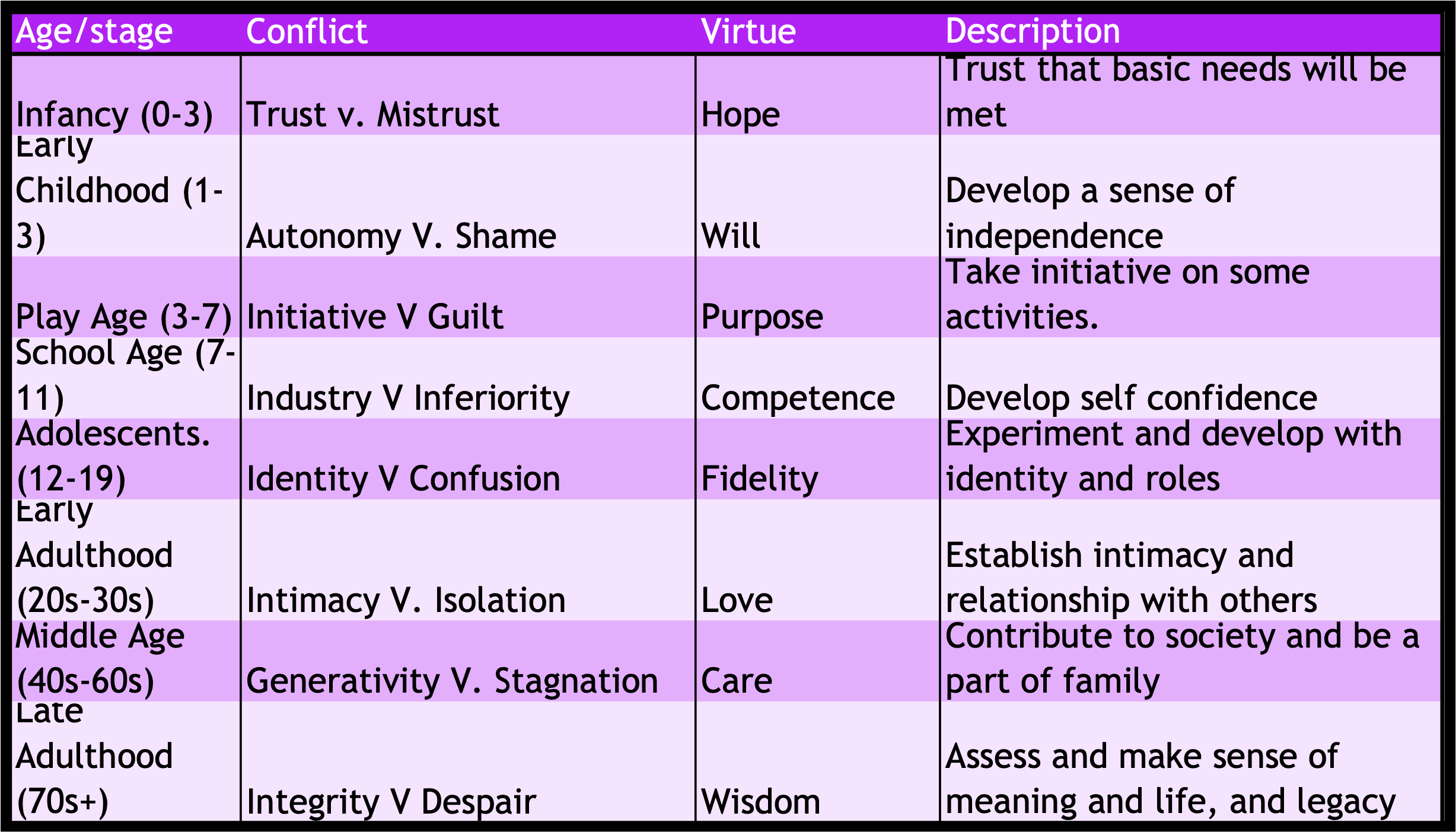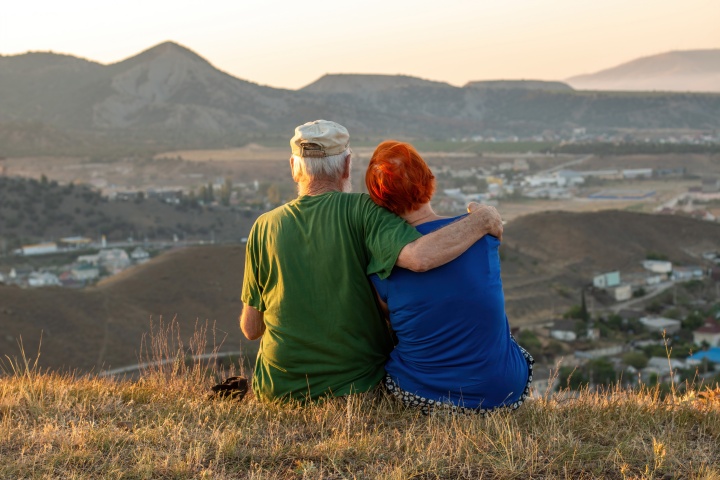A neurologic injury can cause physical and emotional changes. The physical impediments are easy to identify. The emotional changes can be a little harder to see but may have the greatest impact on recovery.
Emotional barriers to recovery can be the result of the size and location of damage to the brain. However, another less talked about cause comes from the well-meaning medical providers.
I recently re-read Erik Erickson’s stages of psychological development, and I think it might be essential to provide a little review, so bear with me.

Erik Erickson’s work rightfully defines all life transitions as “crises.” According to his stages of psychological development, early childhood is highlighted by the battle for trust, autonomy, initiative, and competence. If we come out on the other side unscathed, our behaviors are sprinkled with a little bit of hope, will, purpose, and competence.
If you have raised kids, I am not telling you anything you don’t already know. If your adult children are functioning members of society, you most likely raised them in a manner that helped them develop the necessary psychological toolkit.
Enter a catastrophic health crisis limiting your physical abilities……..
Now, enter well-meaning healthcare providers who aim to ensure that someone doesn’t succumb to a preventable injury.
Bring out the bed alarms, chair alarms, vail beds, “soft restraints”, hoyer lifts, gait harnesses, gait belts, and “family training”. Because clearly someone with a mobility issue can’t be left alone. Ever.
Goodbye autonomy, agency, and competence. Please welcome shame, guilt, and inferiority.
But transitioning from the hospital to home is not something we do “willy-nilly”. Nope, we take great care to train a loving spouse to bath, groom, feed, dress, and use proper body mechanics while “man-handling” a grown adult. Vanna, please close the door on “intimacy” and instead reveal door number 4…… isolation.
I completely support the rationale that family should be trained to provide the best possible care for a loved one. But Houston, we have a problem. The plane is off course and is about to fly straight into the Bermuda Triangle.
I see grown men and women asking for permission from their spouse for a drink of water, or going to the bathroom. I see well-meaning spouses telling a grown man/women how to answer my questions and to “pay attention when someone is talking to you”.
Mayday, mayday… we have lost track of the aircraft…
There is a goldilocks zone for “appropriate amount of assistance”.
I have countless stories of patients who, by any definition, should NOT be living alone. Yet they are. In fact, had I been their therapist early in their recovery, I may have strongly recommended “placement” in a skilled nursing facility. Thankfully I wasn’t there to provide my ½ cent.
You see, there are outliers—the ones who “go against medical advice.” These individuals are the most instructive. I had a patient several years back who had a dependent child at home. She refused “placement.” By the time I met her, she was doing things that I am sure “experts” at the time thought she would never do.
This brings me to Erikson’s theory on middle and late adulthood. Middle adulthood is defined by “generative work.” This can be raising children or doing a job you enjoy. The key is being productive. Removing those opportunities from an individual would be “suboptimal” at best, not just for “recovery” but for overall quality of life.
Often, I must assume the role of “teacher” to people much older than me. It always warms my heart when I have a patient “flip the script” and “counsel me” on finances, relationships, kids… etc. Not because I “need” the advice (although I can’t help but think my occupation has helped me to self-identify as wise beyond my years). Nope, it isn’t for what it is doing for me but what it means about their recovery.
This leads me to Erickson’s final stage of life….. integrity versus despair. Humans are designed to leave behind a legacy. This stage of life is defined by making meaning out of a lifetime of experience and imparting it to the next generations. To not have this opportunity is, at best, “suboptimal.” To have it completely removed can lead to despair.
My grandfather lived to be 91. I remember our phone calls like they were yesterday. Some of my favorite memories were the stories from “the good old days”. Tasting Pizza for the first time. “Bread with cheese and meat and sauce was the most exciting thing that came to our little town”. Boxcar racing, growing up on a farm, starting his business with zero cash and on and on. I could sense he enjoyed telling me the stories. But there was more. It was the moment in the conversation when he would realize he was telling me something I didn’t previously know. It was these moments when he would get a little spark in his voice. The story would get just a little more detailed transitioning from casual conversation to full on history professor.
Generativity (noun) is the ability to create or produce something new contrasted with stagnation in which something stays the same and does not grow and develop. (Source)
Neuroplasticity is when the brain rewires around new experience. We are starting to grasp a better understanding of this when it comes to physical movement. But this is a siloed and suboptimal approach to helping to restore a whole person to an optimal quality of life.
So, what’s the solution? That will be different for different people. There is no denying some people have significant safety concerns and need 24/7 care with basic needs. However, experience has revealed this is NOT the majority.
I recently met “John” who suffered a stroke a little over a year ago (name changed). John’s goal is to be able to stand at the sink to wash dishes “so I can help my wife with household chores.” He knows he is not yet safe to walk on his own. So he doesn’t and waits for assistance with walking activities.
Hope, Will, Purpose, Competence, Fidelity, Love, Care, Wisdom……
Our lives are shaped by our experiences. At the end of our lives, we can only hope we played the game the best we could with the hand we were dealt. Being “dealt” a neurologic diagnosis or a loss of mobility isn’t an “ideal” card, but it doesn’t have to mean you throw in your entire hand. In fact, the ones who are dealt the worst hand are typically the most skilled players.
“Caregiving” for a spouse or a parent can be a “messy” job. “Roles” take on new meanings. New experiences will be met with uncertainty and a fair amount of “winging it”. The hardest part of all is finding the balance between “caregiver” and spouse or “parent” < – > “child”. There is no one-size-fits-all. But in all cases, the “caregiver” is now, in part, responsible for dealing the cards. If dealt thoughtfully, a “mobility issue” is a deviation but not a regression. Agency, Identity, and Competence are re-established and re-open the gate to intimacy, generativity, and legacy.
A level of independence is possible. Agency is possible. Living a meaningful life and stamping your mark on the next generation is possible. It is not only possible, it is essential.
What can you do today to produce? What can you do today to pour into the next generation? If you are a caregiver, how can you (safely) loosen the reigns?
For everything there is a season, and a time for every matter under heaven:
a time to be born, and a time to die;
a time to plant, and a time to pluck up what is planted;
a time to kill, and a time to heal;
a time to break down, and a time to build up;
a time to weep, and a time to laugh;
a time to mourn, and a time to dance;
a time to cast away stones, and a time to gather stones together;
a time to embrace, and a time to refrain from embracing;
a time to seek, and a time to lose;
a time to keep, and a time to cast away;
a time to tear, and a time to sew;
a time to keep silence, and a time to speak;
a time to love, and a time to hate;
a time for war, and a time for peace.
Ecc 3:1-8


Well said THANK YOU FOR THIS…
You have such a gift! Thank you for using it so well. Wisdom beyond your years for sure!
Doc: my comments aside for a later time but of your community i would like to ask how many caregivers actually read and participate here?
Just a question and random personal survey to assist me in my response to this posting; because now we are getting to the personal category of individual comments and there are boundaries.
Great to see you this week George and thanks for the question! My intent was not to “alienate” anyone on the care team but to bring awareness to the unintentional consequences of the actions and language we choose when caring for someone who is living through an “atypical transition” in the human experience. I have HUGE compassion and empathy for all involved parties, equally, for the caregiver and the one who is receiving the care. I wait in eager expectation to learn from your lived experience 🙂